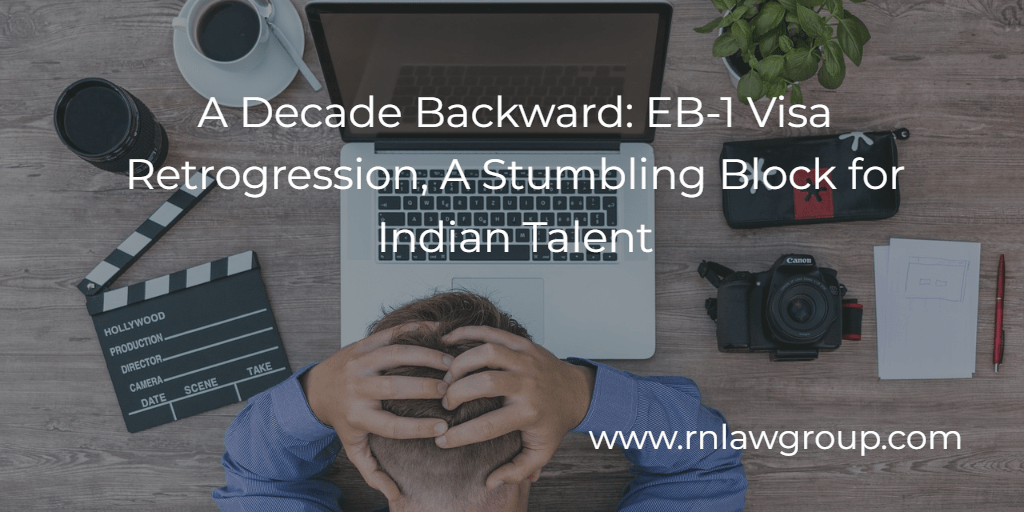
A Decade Backward: EB-1 Visa Retrogression, A Stumbling Block for Indian Talent
In recent times, the United States has emerged as a magnet for international talents, attracting a multitude of exceptional individuals from around the globe. However, a crucial development in the August 2023 Visa Bulletin issued by the U.S. Department of State has created ripples of concern, particularly among Indian professionals eyeing the ‘American Dream.’ The Final Action Date for the Employment-based First Preference (EB-1) category for India has seen an unprecedented retrogression, moving back by a staggering ten years. This translates to a significantly extended waiting period for Indian professionals wishing to migrate to the U.S., dampening their aspirations and affecting the competitiveness of the American economy in the global arena.
The EB-1 category is designed for “priority workers,” a group that encompasses individuals with extraordinary abilities, outstanding professors and researchers, and certain multinational managers and executives. These are individuals who, with their unique talents and skills, contribute significantly to various sectors of the U.S. economy, education, and cultural sectors. The retrogression has created a situation where these highly skilled professionals from India, despite their qualifications, will have to wait for an extended period before their applications can be processed.
The shift in the EB-1 Final Action Date from February 2022 to January 2012 is not merely a statistic but a life-altering event for these professionals and their families. This move implies a decade-long holdup, leading to a dramatic disruption of life plans, career trajectories, and familial stability.
A noteworthy aspect of this issue is the root cause of the backlog. One primary reason is the country-based caps on the issuance of immigrant visas, which limit the number of individuals from a particular country who can receive these visas each year. This approach often results in extended wait times for applicants from countries with high demand, such as India and China, regardless of their skills or the potential value they bring to the U.S.
Another factor contributing to this significant backlog is the counting of derivative beneficiaries, such as spouses and children, towards the annual visa limit. If the administration adopted a policy of not counting these family members against the cap, it could drastically reduce waiting times and make the process more efficient.
These concerns are not just the woes of immigrants but also impact the U.S. economy. Highly skilled immigrants drive innovation, fill labor gaps, and contribute significantly to economic growth. By delaying their entry, we risk losing these talents to other nations with more welcoming immigration policies.
While the Department of State has signaled that it may return the EB-1 category to ‘current’ by October for several countries, the plight of Indian professionals remains uncertain. For the category to become current, it would require the administration to process the pent-up demand swiftly and efficiently, a daunting task given the existing backlog.
In this scenario, legislative intervention can play a vital role in rectifying the situation. A revamp of the existing immigration laws, particularly with regard to the removal of per-country visa caps and the non-counting of derivative beneficiaries, could go a long way in resolving these backlogs.
As it stands, this backward shift in the EB-1 Final Action Date paints a gloomy picture for highly talented Indian professionals eyeing a future in the U.S. It highlights the urgent need for immigration policy reform. For the U.S. to continue to attract and retain global talent, it must act decisively to streamline its immigration processes and reassess its policies.
The current situation underscores the need for a holistic reconsideration of our immigration policies. Only through such a reevaluation can we ensure the continued influx of talent that has made the U.S. the innovation leader it is today. The administration, the legislative bodies, and all stakeholders must come together to address this issue urgently, or we risk the loss of global talents to countries with more accommodating policies. In the competitive global landscape, we can ill afford such a setback.
By: Rahul Reddy
Rahul Reddy, a seasoned lawyer in the realm of employment-based immigration, is the founding partner of Reddy & Neumann PC. With an impressive career spanning over 28 years, he inaugurated the firm in 1997, bringing a wealth of knowledge and a unique perspective to the intricate landscape of immigration law.
Rahul’s understanding of the complexities inherent in the immigration system is vast and nuanced, making him an indispensable resource in this specialized field. This comprehensive expertise, coupled with his personal encounters with the immigration system, has imbued him with a profound empathy for his clients. Each case he undertakes is informed by this personal connection, as he understands the unique challenges and aspirations that drive individuals to navigate the immigration process.
Passionate and committed, Rahul is driven by a desire to assist others in realizing the quintessential American Dream. His mission, underpinned by years of professional experience and personal insight, remains focused on providing excellent legal support to those seeking employment-based immigration solutions.

